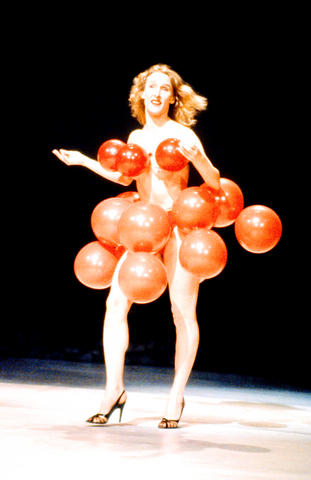Pina Bausch, Germany's grand dame of modern dance, is returning to Taipei next week with her Tanztheater Wuppertal and tickets to the four-day run at the NationalTheater are as precious as gold.
The entire four-day run of Masurca Fogo, which starts Thursday night, was sold out almost a month ago. That is not so surprising, considering that it has been 10 years since the company was here. They were supposed to come in April 2003 but the engagement was canceled because of the SARS outbreak.
Created for the 1998 World Expo in Lisbon, Portugal, Masurca Fogo is classic Bausch: a mix of dance and theater; seemingly unrelated, often bizarre solos strung together with beautiful group pieces; musings on love, sexual attraction and violence and a set that appears to be downright dangerous for the dancers.

PHOTO: COURTESY OF NTCH
The dancers climb up and down the rock-strewn set, they build a water slide, they construct a house out of pieces of wood and then have a samba party, they pop a dress made out of balloons with cigarettes.
Bausch takes movements from everyday life - walking, running, fighting, bathing, drinking and eating - and turns them into something extraordinary.
The music - Fado songs from Cape Verde and Brazil, compositions by Gidon Kremer and k.d. lang, among others - both drives the piece and help lighten the mood.
Hopefully, Taipei audiences won't have to wait another 10 years for a chance to see the company; either the National Theater or someone will bring the troupe back soon.
However, don't despair if you missed out on getting tickets. Veteran Bausch dancer Dominique Mercy will be conducting a workshop for dancers and students at the National Theater's studio on Oct. 1 and Oct. 2. For more information or to register for the workshop, visit the National Theater's Web site at www.ntch.edu.tw. Another option is to go to the Taipei Fine Arts Museum, where you can catch Lee Yanor's beautiful documentary Coffee with Pina every weekend at 2pm though Nov. 18.

The unexpected collapse of the recall campaigns is being viewed through many lenses, most of them skewed and self-absorbed. The international media unsurprisingly focuses on what they perceive as the message that Taiwanese voters were sending in the failure of the mass recall, especially to China, the US and to friendly Western nations. This made some sense prior to early last month. One of the main arguments used by recall campaigners for recalling Chinese Nationalist Party (KMT) lawmakers was that they were too pro-China, and by extension not to be trusted with defending the nation. Also by extension, that argument could be

Aug. 4 to Aug. 10 When Coca-Cola finally pushed its way into Taiwan’s market in 1968, it allegedly vowed to wipe out its major domestic rival Hey Song within five years. But Hey Song, which began as a manual operation in a family cow shed in 1925, had proven its resilience, surviving numerous setbacks — including the loss of autonomy and nearly all its assets due to the Japanese colonial government’s wartime economic policy. By the 1960s, Hey Song had risen to the top of Taiwan’s beverage industry. This success was driven not only by president Chang Wen-chi’s

Last week, on the heels of the recall election that turned out so badly for Taiwan, came the news that US President Donald Trump had blocked the transit of President William Lai (賴清德) through the US on his way to Latin America. A few days later the international media reported that in June a scheduled visit by Minister of National Defense Wellington Koo (顧立雄) for high level meetings was canceled by the US after China’s President Xi Jinping (習近平) asked Trump to curb US engagement with Taiwan during a June phone call. The cancellation of Lai’s transit was a gaudy

The centuries-old fiery Chinese spirit baijiu (白酒), long associated with business dinners, is being reshaped to appeal to younger generations as its makers adapt to changing times. Mostly distilled from sorghum, the clear but pungent liquor contains as much as 60 percent alcohol. It’s the usual choice for toasts of gan bei (乾杯), the Chinese expression for bottoms up, and raucous drinking games. “If you like to drink spirits and you’ve never had baijiu, it’s kind of like eating noodles but you’ve never had spaghetti,” said Jim Boyce, a Canadian writer and wine expert who founded World Baijiu Day a decade